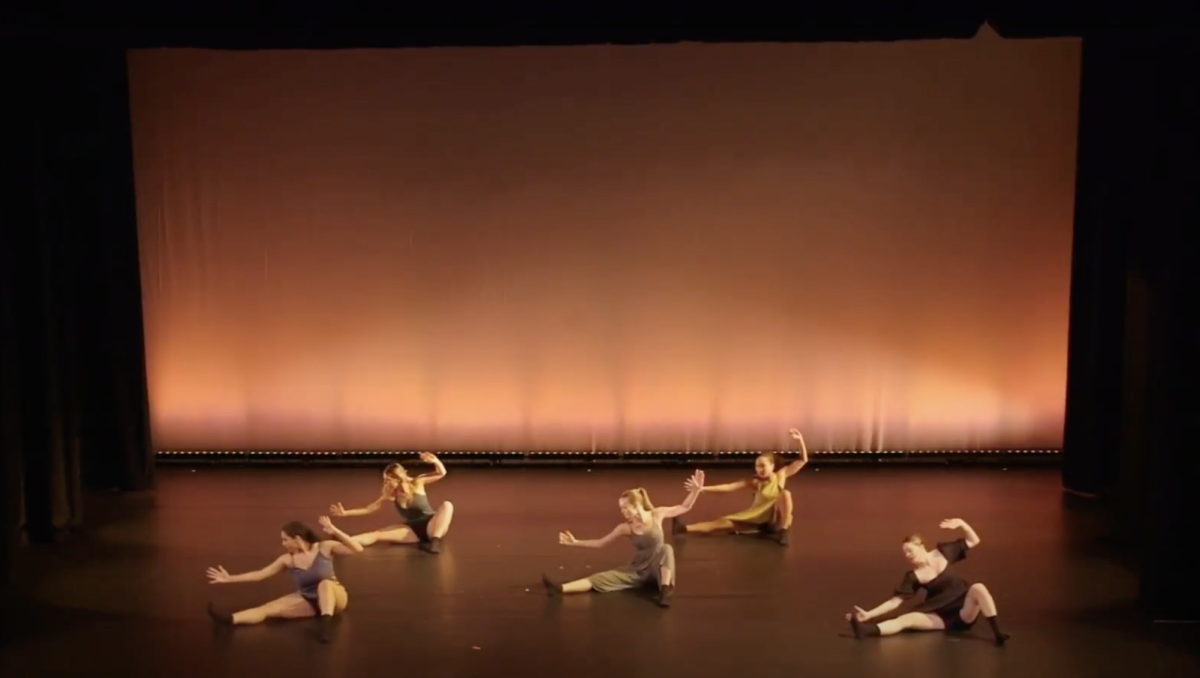“Victoria’s Secrets” is back with a second season! This season, host Victoria Freeman (CAS ’26) will be narrowing the focus of her podcast to her true passion, theater productions. In the first episode of season two, Freeman reviews the Shakespeare Theatre Company’s production of “Evita,” running from Sept. 5 to Oct. 15, 2023. Tune in to hear her in-depth analysis about everything from the directing to the sets, and why it reminds her of an acoustic cover of “Cruel Summer” by Taylor Swift.
Transcript
Victoria Freeman (VF): Hi, it’s Victoria, and I have a secret.
VF: After a long summer away, we’re back. “Victoria’s Secrets” has returned. And after a semester of reviewing different types of things, I realized that one of the only things I really, really enjoy reviewing is theater. And I hate to say it because I’m really exposing myself as a theater nerd right now, but it had to be done. It had to be done for my own joy. Sorry.
So only the real ones are going to know about this, but if you remember, my long-term listeners, if you remember my review of “King Lear” at the Shakespeare Theatre Company, I went back to see their latest production, the first in their 2023 to 2024 season. And this time, it was of “Evita,” at Harman Hall. And of course, I absolutely loved their production of “King Lear.” So I had the highest of expectations. Um, spoiler alert. The same thing didn’t exactly happen this time.
So let’s get into it. The first thing that I want to talk about is the acting, and we’ve got Shereen Pimentel as our main leading lady here, Evita, the woman who has to carry the show on her back. And first things first, I have to tell you, that woman is an absolutely glorious singer. Nothing bad could ever be said about her voice. If you know anything about “Evita,” you know that Eva Perón has to have one of the most gorgeous tones you’ve ever heard and carry a two-hour long show on her back. For example, “A New Argentina”, the musical number at the end of Act One, requires absolute insanity in the vocal range. And Pimentel really, really carried through.
Other than that, in terms of her acting choices, I have to say I was a bit overwhelmed, underwhelmed. And what this really comes down to for me, is the purpose, the true message of “Evita,” — and the story, if you don’t know it, it’s of Eva Perón, the wife of the populist dictator, Juan Perón. And Evita is a lower class woman, Eva Duarte, who rises through the ranks to become not just the wife of a populist dictator, but also this mythic, saint-like figure in Argentine history. So it’s truly a story of a woman rising through the social classes. And in order for this to be appreciated, my take is that you really have to believe that Evita is in control of her own life, that she is the one who’s engineering all of these wonderful things to happen, in the sense that she’s an absolutely amazing person, unbelievably powerful that she so like usurped her own life like this.
And unfortunately, I did not pick up any of that from this rendition of Eva Perón. Because it seemed to me like things were simply happening to her, as opposed to Eva pulling the strings in her own life or using all of the men in her life to get what she wants, which is what Eva Perón did, as the song “Goodnight And Thank You” if you know it, might suggest where she thanks all of the men that she has affairs with for helping her rise in social status. But it didn’t seem to me like that was what was going on. It seemed like the things were kind of just happening to her, which is, I think, a fundamental error in how the show “Evita” has to go.
And now to move on to the direction, which the director of this piece was Sammi Cannold. And my overall take is I just, I wanted more drama. I’m sorry, I’m a dramatic person. And this was not giving me enough drama. And so just as an example, one of the first numbers of the show is “On This Night of a Thousand Stars,” When Eva begins her affair with the singer Magaldi. And I think this scene has to be absolutely electric. You have to feel Eva’s youth, and you have to feel her either being seduced by or seducing Magaldi, whichever way you want to play it. I was bored, to be completely honest with you.
We were watching a tiny, tiny performance with very few people attending this faux show, this show within a show, Magaldi’s performance, and there was no excitement. And so when you work that in conjunction with a set that absolutely never changed throughout the course of the show, the stakes were never raised. There was no drama being ramped up.
But then it wasn’t all bad. It wasn’t all bad. So what did I like about the direction? I think the role of Che, as the narrator who was played by Omar Lopez-Cepero, was absolutely fantastic. Because one of the things that I really, really liked about the set is that it played on the idea of a stage within a stage. So you see the frame, and then you see Che outside of the frame of the stage. Although, of course, like he’s still on the proscenium. He’s in front of the audience, but he’s not exactly on the stage that’s framed. And I think that this is really interesting, because not only do we have Che as the narrator walking us through everything that’s happening on the real stage, everything that’s going on, but it also plays on the larger idea that all of Eva’s life was just for show. All of her life was in the public eye, being judged by everyone. And I think that putting this stage within a stage and putting Che outside of it worked to really demonstrate how much of Eva’s life was like that. So I thought that was a really good directorial choice. I enjoyed that one.
So now on to costume design, which was done by Alejo Vietti. Mostly what I have to say about this is it never goes noticeably wrong. You never look at a costume and go, “Oh, my God, terrible, so, so out of place.” But the costume design, I think, could have been a lot better. And I’m aware, there’s only so much creativity you can have, because of the fact that, for example, we’ve got a lot of members of the military, well, how are you going to dress them? You’re going to dress them like members of the military. So fair, I completely understand that.
But just as a little bit of a side note, this entire production this two-hour long play, the military comes off as absolute buffoons, including Juan Perón himself, which I think is a really big problem, because you have to believe that this is going to become a dictatorship, you have to believe that the military are pulling the strings here and turning this democracy into something far, far more sinister. Instead, they’re entirely played for laughs, which I think is a larger problem with the show not really having any direction that it’s going in in terms of overall messaging, but that was just a little bit of a side note.
One of my central problems that I had with the costuming is that Shereen Pimentel as Eva absolutely never appears young. And I’m aware that she has to be played by a full grown woman, she has to have enormous range and you see her over the course of her life until she dies. So you can’t exactly hire an 18 year old to play Evita. However, you also have to see her development over time from an innocent young girl to the mythic Evita that we all know, and I simply was never ever, ever picking up on her being young. And something that I think could have really helped that is costuming, we could have really believed that she was a young girl based on how she was dressed. But instead, she just kind of wore some white dresses, some white frocks, if you will, that came off looking quite frumpy in my opinion and did not make her look young. So they didn’t solve that problem.
And now moving on to what set design by Jason Sherwood, it was an atrocity. I’m sorry, it was an absolute atrocity. Everywhere we went throughout this show looked exactly the same. And one of the best examples of this is in Act One, the song “Buenos Aires,” you’re supposed to believe that we’ve just been transported from a town in rural Argentina, to this bustling, exciting, amazing city. You see Eva, so excited to be there. It looked exactly the same. I didn’t believe that we had traveled anywhere at all. And that’s because this set design was unbelievably minimalist. There was really no set at all except for some light up arches in the background. And believe me, no one is more excited to suspend their disbelief than I am, but I just wasn’t having it. I cannot suspend my disbelief that intensely to believe we were just transported to somewhere radically different when I see absolutely no change in the set. So forgive me for saying it, but I don’t think this is the show to go minimalist.
But I know I’ve been a little bit of a downer. So let’s discuss my absolute favorite moment from the show which was “Don’t Cry For Me Argentina,” and other than the fact that it was an absolute classic (we all love the song) the set was lovely here. It was essentially rows upon rows of flowers that Evita was standing in the middle of, and they rise as you go back in the stage so all you see as an audience member is flowers. And this is a fantastic way to just emphasize the gaudiness of Eva’s life, the fact that it’s all just a facade. And then other than her beautiful singing throughout the song, as the song ends, the flowers rise and below them and you see the Argentine workers exposed underneath the flowers, absolutely hailing Evita as their hope for glory. And I think that the symbolism of this moment was one of the most effective in the entire show. It’s one of the only times actually that we were able to understand that the story is fundamentally about class.
So what would this be, if it were a song? Don’t worry, I didn’t forget about that. Um, if this were a song, this would be an acoustic cover of “Cruel Summer” by Taylor Swift, in the sense that you want to be on its side, you’re so ready for the acoustic cover, subtlety is good in theory, you know how it is. In real life, you just want it to get hype. You want the beat to drop, and it just never, ever drops.
Now for the secrets. Remember how before I said that I was exposing myself as a theater nerd. Well, way back in the olden days, I actually used the song, “Another Suitcase in Another Hall” as my audition song. Yes, I know that’s basic. But I did it. And I absolutely love that song. It is one of my absolute favorites, which is why I am so so frustrated with how that song appeared in this show, because in this show, the beauty, the simplicity of the melody is completely overshadowed by making Perón’s mistress go through kind of a dumb show of her sleeping with a bunch of different men. Which, spoiler alert, is already in the lyrics of the song. We’re not stupid. We actually already know that that’s what she’s doing. So we don’t need to see the pantomimes. I was extremely frustrated. I’m sorry. I let my emotions get the better of me. So what’s my final rating? I would give this show a three out of 10. I was underwhelmed. I’m sorry, but this is proof that I don’t just rate everything highly. I have high standards for theater. It’s true.
So thank you so much for listening. I’ll see you next time.
VF: This podcast was recorded by me, Victoria Freeman, edited by Amna Shamim and produced by Amna Shamim and Emily Han.













